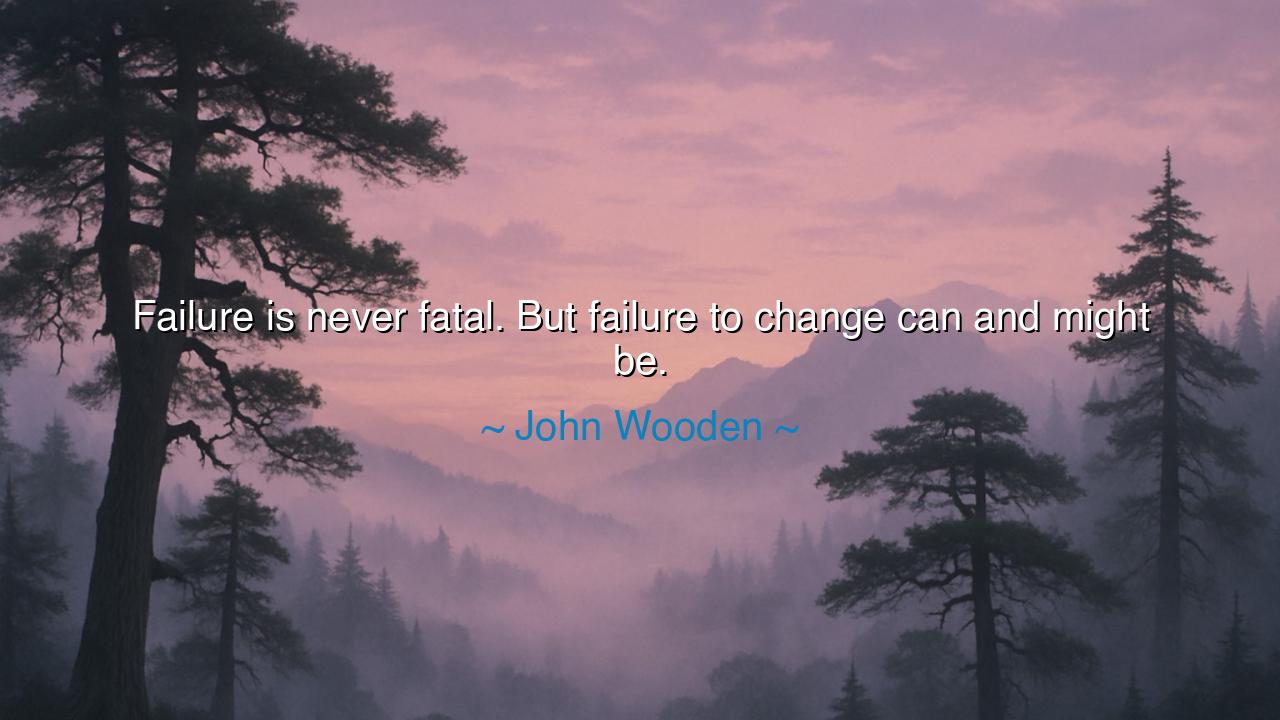
Failure is never fatal. But failure to change can and might be.






Host: The study was quiet, the soft hum of the clock ticking marking the passage of time. Outside, the world had started to settle into the quiet of the evening, the sun long gone and the night creeping in. Inside, Jack sat at his desk, his thoughts clearly drifting between the task at hand and something deeper, something that had been on his mind for a while. Jeeny sat nearby, a book in her lap, but her eyes were focused on him, sensing the shift in the air.
Jeeny: (breaking the silence, her voice gentle but insightful) “You know, John Wooden once said, ‘Failure is never fatal. But failure to change can and might be.’”
(She looked at Jack, her tone calm but filled with curiosity.) “What do you think he meant by that? About how failure itself isn’t fatal, but failure to change could be?”
Jack: (pausing, his voice reflective as he considered the words) “I think he’s saying that failure, in and of itself, isn’t the end. It’s part of the process, part of the journey. We all fail at some point, but that doesn’t mean we’re finished. What matters more is how we respond to failure. If we don’t learn from it, if we don’t change or adapt, that’s when we start running into trouble.”
Jeeny: (nodding slowly, her voice steady) “Exactly. Failure isn’t fatal because it’s something we can bounce back from. It’s how we approach it that matters. If we fail and don’t change our approach, then we risk being stuck in the same place, making the same mistakes over and over. That’s what can become fatal — when we stop growing or evolving.”
Jack: (smiling faintly, his tone lightening a bit) “It’s like a reset button, right? Failure isn’t a permanent state. It’s a signal that we need to shift, to rethink, to improve. But if we stay in that state, if we don’t make the necessary changes, we get left behind.”
Jeeny: (gently, her voice full of understanding) “Yes, failure can be a powerful teacher, but only if we’re willing to learn from it. If we don’t change, if we don’t adjust to new circumstances, then we’re setting ourselves up for future failure. The key isn’t to avoid failure, but to be ready to change after it happens.”
Jack: (thoughtfully, his voice softer now) “It’s about resilience, isn’t it? Being able to fail, get back up, and adapt. That’s what makes failure productive. Without that ability to change, we’re just repeating the same cycle.”
Jeeny: (smiling warmly, her voice full of quiet encouragement) “Exactly. It’s not the failure that defines us. It’s how we handle it, how we grow from it, and how we choose to change. And that’s what leads to true progress, to real success.”
Host: The room seemed to settle into a deeper understanding, the weight of Wooden’s words hanging in the air. Failure, though often seen as a setback, was not the end. It was a step along the path, a moment of learning, an opportunity to change. Jack and Jeeny both understood that it wasn’t failure itself that could be fatal, but the failure to adapt, to grow, to move forward.
Jack: (smiling softly, his voice more certain now) “I think I understand now. Failure isn’t the end of the road. It’s just a signpost, telling us that it’s time to change direction.”
Jeeny: (nodding, her voice calm and supportive) “Exactly. It’s about using failure as a stepping stone, learning from it, and then moving forward, better and stronger.”
Host: The city outside continued its quiet rhythm, but inside, there was a sense of clarity, a quiet confidence in the understanding that failure was not an obstacle, but a part of growth. It wasn’t the failure itself that mattered, but the willingness to change and grow from it — and in that, there was the true power to move forward.






AAdministratorAdministrator
Welcome, honored guests. Please leave a comment, we will respond soon